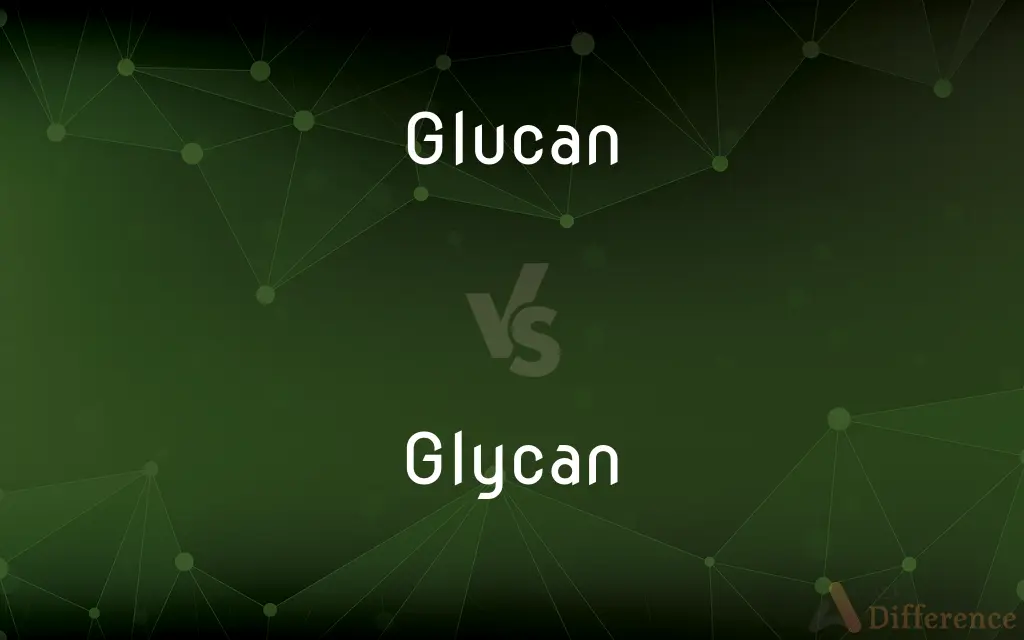Glucan vs. Glycan — What's the Difference?
By Urooj Arif & Fiza Rafique — Updated on April 22, 2024
Glucan refers to polysaccharides composed solely of glucose units, while glycan is a general term for any polysaccharide or oligosaccharide, encompassing a wide variety of sugar forms.

Difference Between Glucan and Glycan
Table of Contents
ADVERTISEMENT
Key Differences
Glucan is specifically a type of polysaccharide made up entirely of glucose molecules linked together. These can be found in various forms such as beta-glucan or alpha-glucan, depending on the type of glycosidic linkage between the glucose units. For example, beta-glucan is well-known for its presence in the cell walls of cereals, fungi, and yeasts, and is praised for its health benefits, including immune system support.
On the other hand, glycan encompasses a broader category of carbohydrates that includes not only polysaccharides but also oligosaccharides, which can consist of various types of sugar units besides glucose. Glycans play crucial roles in biological processes, including cellular recognition, signaling, and immune responses. They are found in a wide array of biological structures, from plant cell walls to glycoproteins in human cells.
While glucans are primarily sourced from plants and some fungi, providing structural and nutritional functions, glycans are involved in more complex biological functions and are found throughout the natural world in various organisms. Glycans' structures can be incredibly diverse, reflecting their various roles in cell interaction and communication.
Glucans are typically studied for their dietary and health-related properties, particularly in nutrition and medicine. Glycans, however, are often studied in the context of biochemistry and cell biology for their roles in the structure and function of cells and tissues.
Understanding the differences between glucan and glycan is important not only for basic science but also for applications in medicine, nutrition, and biotechnology, where these molecules play significant roles.
ADVERTISEMENT
Comparison Chart
Composition
Composed entirely of glucose units
Can be composed of various sugar units
Types
Beta-glucan, alpha-glucan
Polysaccharides, oligosaccharides
Found in
Cereals, fungi, yeasts
All living organisms
Biological Role
Structural support, nutritional benefits
Cellular communication, immune response
Key Applications
Health supplements, food industry
Biomedical research, pharmaceuticals
Compare with Definitions
Glucan
A polymer of glucose.
Beta-glucan from oats is often used in cereals for its health benefits.
Glycan
A general term for carbohydrates that can form complex structures.
Glycans on cell surfaces are crucial for cell-cell recognition.
Glucan
Known for contributing to dietary fiber.
Glucan is a key component in the dietary fiber of whole grains.
Glycan
Includes both polysaccharides and oligosaccharides.
Glycoproteins are proteins linked with glycans, impacting protein stability and function.
Glucan
Found primarily in the cell walls of plants and some microbes.
The cell wall of baker’s yeast contains glucan, providing structural integrity.
Glycan
Involved in numerous biological processes.
Glycans play roles in viral infection mechanisms by facilitating viral entry into host cells.
Glucan
Involved in the storage of energy in plants.
Starch, a type of glucan, serves as an energy reserve in plants.
Glycan
Can be highly diverse in structure.
The diversity of glycan structures on human cells affects blood type, cell signaling, and immune responses.
Glucan
Often extracted for use in nutritional supplements.
Glucan extracts are marketed for their potential immune-boosting properties.
Glycan
Studied in biotechnological and medical fields.
Glycans are targets for developing new vaccines and therapeutics due to their biological significance.
Glucan
A glucan is a polysaccharide derived from D-glucose, linked by glycosidic bonds. Many beta-glucans are medically important.
Glycan
The terms glycan and polysaccharide are defined by IUPAC as synonyms meaning "compounds consisting of a large number of monosaccharides linked glycosidically". However, in practice the term glycan may also be used to refer to the carbohydrate portion of a glycoconjugate, such as a glycoprotein, glycolipid, or a proteoglycan, even if the carbohydrate is only an oligosaccharide.
Glucan
Any of various polysaccharides that are polymers of glucose and are components of the cell walls of plants, algae, fungi, and bacteria.
Glycan
Any of a group of sugar molecules that are freestanding as oligosaccharides or polysaccharides or are combined in conjugates, as in glycoproteins.
Glucan
(carbohydrate) Any polysaccharide that is a polymer of glucose
Glycan
(cabrohydrate) Any polysaccharide or oligosaccharide, especially one that is part of a glycoprotein or glycolipid.
Common Curiosities
What is the primary function of glucans in nature?
In nature, glucans mainly provide structural support to plant cell walls and store energy.
Can glucan be used medically?
Yes, glucan, particularly beta-glucan, is used for its immune-enhancing and cholesterol-lowering properties.
What role do glycans play in biotechnology?
Glycans are used in biotechnology for drug delivery systems, vaccine development, and as biomarkers for diseases.
Are all glycans derived from glucose?
No, glycans can be derived from various sugars, not just glucose, including galactose and mannose.
What dietary sources are rich in glucans?
Cereals, barley, oats, and certain mushrooms are rich sources of glucans.
How does glucan contribute to plant defense?
In some plants, glucans can act as signaling molecules that trigger defense responses against pathogens.
How are glycans analyzed in the laboratory?
Glycans are typically analyzed using specialized techniques like mass spectrometry and chromatography to determine their complex structures.
How are glycans related to human health?
Glycans are crucial for immune system function, cell signaling, and disease progression, including cancer and infectious diseases.
What is the difference between starch and cellulose?
Both are glucans, but starch (alpha-glucan) is an energy storage molecule that is digestible by humans, while cellulose (beta-glucan) provides structural support in plant cell walls and is not digestible by humans without bacterial assistance.
What is the significance of glycosylation in proteins?
Glycosylation, the addition of glycans to proteins, affects protein folding, stability, and cell interaction, crucial for many biological functions.
Share Your Discovery

Previous Comparison
Late vs. Ate
Next Comparison
Mattock vs. PickaxeAuthor Spotlight
Written by
Urooj ArifUrooj is a skilled content writer at Ask Difference, known for her exceptional ability to simplify complex topics into engaging and informative content. With a passion for research and a flair for clear, concise writing, she consistently delivers articles that resonate with our diverse audience.
Co-written by
Fiza RafiqueFiza Rafique is a skilled content writer at AskDifference.com, where she meticulously refines and enhances written pieces. Drawing from her vast editorial expertise, Fiza ensures clarity, accuracy, and precision in every article. Passionate about language, she continually seeks to elevate the quality of content for readers worldwide.














































